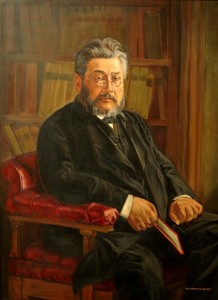 “… our first parents violated the conditions of the covenant of works, forfeiting its eternal blessing and incurring its eternal curse. But the Father’s purpose to grant His beloved Son a kingdom of loving, loyal human subjects (Luke 22:29) could not be thwarted by Adam’s sin. In fact, Adam’s treachery could only serve God’s agenda, to display the greater glory of divine grace. The Son would stand among the many children whom God gave Him (Heb. 2:13) as their Liberator from fear and death through His own death (Heb. 2:14–15). The Son would shepherd the sheep given to Him by the Father — sheep whom He calls by name (names inscribed in his Book of Life from eternity past, Rev. 17:8), who are safe in His and the Father’s strong hands. For He, their Shepherd, would lay down His life for them and take it up again, in keeping with the Father’s command (John 10:2, 14–18, 28–29). The Son would finally report His mission accomplished — the mission to glorify the Father by revealing Him to those whom the Father had given Him and by protecting them through the Father’s name (John 17:4, 6, 12). As a result, the Son would lay claim to well-earned glory, and He would entrust His people to the Father and the Spirit for protection and perfection (John 17: 5, 11, 15–19).” – Dennis Johnson
“… our first parents violated the conditions of the covenant of works, forfeiting its eternal blessing and incurring its eternal curse. But the Father’s purpose to grant His beloved Son a kingdom of loving, loyal human subjects (Luke 22:29) could not be thwarted by Adam’s sin. In fact, Adam’s treachery could only serve God’s agenda, to display the greater glory of divine grace. The Son would stand among the many children whom God gave Him (Heb. 2:13) as their Liberator from fear and death through His own death (Heb. 2:14–15). The Son would shepherd the sheep given to Him by the Father — sheep whom He calls by name (names inscribed in his Book of Life from eternity past, Rev. 17:8), who are safe in His and the Father’s strong hands. For He, their Shepherd, would lay down His life for them and take it up again, in keeping with the Father’s command (John 10:2, 14–18, 28–29). The Son would finally report His mission accomplished — the mission to glorify the Father by revealing Him to those whom the Father had given Him and by protecting them through the Father’s name (John 17:4, 6, 12). As a result, the Son would lay claim to well-earned glory, and He would entrust His people to the Father and the Spirit for protection and perfection (John 17: 5, 11, 15–19).” – Dennis Johnson
Category Archives: Quotes
Miscellaneous Quotes (41)
 “I am an historian, the elders should protect the sinner from the church. When a sinner is defiant, the elders should protect the church from the sinner.”
“I am an historian, the elders should protect the sinner from the church. When a sinner is defiant, the elders should protect the church from the sinner.”
“…a man will be justified by faith when, excluded from righteousness of works, he by faith lays hold of the righteousness of Christ, and clothed in it, appears in the sight of God not as a sinner, but as righteous…” – John Calvin
“The Elect that the Father gives to the Son are preserved by the Son. The basis of our assurance is not to be based upon a confidence of our ability to persevere. We talk about the Perseverance of the Saints and I believe that the saints do in fact persevere but the reason that they persevere is because they are preserved and so it’s better to speak of the preservation of the saints than the perseverance of the saints and so we hear in this chapter Jesus appeals to the Father that those who have been given to Him may be kept.” – R.C. Sproul – Gaining True Assurance part 5 in The Assurance of Salvation series
“A ‘moral’ atheist is like a man sitting down to dinner who doesn’t believe in farmers, ranchers, fishermen, or cooks.” – Greg Koukl
“Where God’s wrath is no longer a problem, Christ’s cross is no longer the solution.” – Michael Horton
Continue reading
Miscellaneous Quotes 40
 “None reverence the Lord more than they who know him best.” – William Cowper
“None reverence the Lord more than they who know him best.” – William Cowper
“It is easier to cry against one-thousand sins of others than to kill one of your own.” – John Flavel
“There is not the meanest, the weakest, the poorest believer on the earth, but Christ prizes him more than all the world besides.” – John Owen, Communion with God (Christian Focus, 2007), 218
“In Christ dwells all the fullness of deity, bodily.” Colossians 2:9….. “Who actually gets what the incarnation is about? The whole fullness of deity… in a body. That’s like all of the oceans of the world… in a cup!” – Jason Meyer
“We need men who will stand before the opposing masses with nothing to help them except the gospel and the God who pledged to work through it.” – Paul Washer
“The gospel is a two-sided coin with forgiveness and life on the one side, and condemnation and death on the other. This truth must be told!” – Paul Washer
“The gospel is not “salvation to all,” but only to “those who believe.” To the rest, it is a sentence of death (II Corinthians 2:16). Christ not only taught that the gospel is for everyone who believes, but he also warned that it is against everyone who does not.” Jn.3:18 – Paul Washer
“Salvation comes to everyone who believes. However, the validity of a man’s confession of faith is confirmed or proven false by his life.” – Paul Washer
Archibald Alexander (1772-1851), founder of Princeton Seminary:
It seems desirable to ascertain, as precisely as we can, the reasons why Christians commonly are of so diminutive a stature and of such feeble strength in their religion.
When persons are truly converted they always are sincerely desirous to make rapid progress in piety; and there are not wanting exceeding great and gracious promises of aid to encourage them to go forward with alacrity. Why then is so little advancement made? Are there not some practical mistakes very commonly entertained, which are the cause of this slowness of growth?
I think there are, and will endeavour to specify some of them.
And first, there is a defect in our belief of the freeness of divine grace.
To exercise unshaken confidence in the doctrine of gratuitous pardon is one of the most difficult things in the world; and to preach this doctrine fully without verging towards antinomianism is no easy task, and is therefore seldom done. But Christians cannot but be lean and feeble when deprived of the proper nutriment. It is by faith, that the spiritual life is made to grow; and the doctrine of free grace, without any mixture of human merit, is the only true object of faith.
Christians are too much inclined to depend on themselves, and not to derive their life entirely from Christ. There is a spurious legal religion, which may flourish without the practical belief in the absolute freeness of divine grace, but it possesses none of the characteristics of the Christian’s life… Even when the true doctrine is acknowledged, in theory, often it is not practically felt and acted on. The new convert lives upon his frames, rather than on Christ; and the older Christian still is found struggling in his own strength… and then he sinks into a gloomy despondency… Here, I am persuaded, is the root of the evil; and until religious teachers inculcate clearly, fully, and practically, the grace of God as manifested in the gospel, we shall have no vigorous growth of piety among professing Christians.” – Archibald Alexander, Thoughts on Religious Experience (Philadelphia: Presbyterian Board of Publication, 1844), 201-2
“The contented man is never poor, the discontented never rich.” – George Eliot
“It is more difficult to be long and convoluted than concise and clear. While it is easy to be comprehensive, it is often more difficult to be direct.” – Jesse Johnson
“Be well instructed in theology, and do not regard the sneers of those who rail at it because they are ignorant of it. Many preachers are not theologians and hence the mistakes which they make. It cannot do any hurt to the most lively evangelist to be also a sound theologian and it may often be the means of saving him from gross blunders. Nowadays we hear men tear a single sentence of Scripture from its connection and cry “Eureka! Eureka!” as if they found a new truth; and yet they have not discovered a diamond, but a piece of broken glass.” – Charles Hadden Spurgeon
“If anyone should ask me what I mean by a Calvinist, I should reply, “He is one who says, Salvation is of the Lord.” I cannot find in Scripture any other doctrine than this. It is the essence of the Bible… I believe nothing merely because Calvin taught it, but because I have found his teaching in the Word of God… ” – C. H. Spurgeon
“If Christ is not all to you He is nothing to you. He will never go into partnership as a part Saviour of men. If He be something He must be everything, and if He be not everything He is nothing to you.” – C. H. Spurgeon
“For all the claims, however, that society is now ‘too visual’ for old-style word-centered religion, and that a book-based evangelicalism runs the risk of becoming a ghetto of middle class, cerebral bookworms with nothing to say to the Generation Xers, there is one embarrassing fact that the new gurus need to face: God gave us a book, full of words, as the basic means of giving us access to his revelation. The gospel is therefore ineradicably verbal and the Bible must remain non-negotiably at the centre of church policy, ministerial training and family life. Not to do so is to leave ourselves vulnerable to every puff of heretical wind that the gurus blow in our direction. It is also to set ourselves above what God himself has laid out for us.” – Carl Trueman, Reformation: Yesterday, Today, and Tomorrow.
“If God created the world, and put one man and one woman in it, married them to each other, and established that as a pattern for the rest of human history, then marriage should be defined in accordance with that reality. If He did nothing of the kind, and we actually evolved out of the primordial goo, then we get to shape and define it however we would like it to go.” – Douglas Wilson
Continue reading
A Bridge Not Far Enough…
 “We are often told (I mean those of us who are commonly nicknamed by the title of Calvinists—and we are not very much ashamed of that; we think that Calvin, after all, knew more about the Gospel than almost any man who has ever lived, uninspired), we are often told that we limit the atonement of Christ, because we say that Christ has not made a satisfaction for all men, or all men would be saved. Now, our reply to this is, that, on the other hand, our opponents limit it: we do not.
“We are often told (I mean those of us who are commonly nicknamed by the title of Calvinists—and we are not very much ashamed of that; we think that Calvin, after all, knew more about the Gospel than almost any man who has ever lived, uninspired), we are often told that we limit the atonement of Christ, because we say that Christ has not made a satisfaction for all men, or all men would be saved. Now, our reply to this is, that, on the other hand, our opponents limit it: we do not.
The Arminians say, Christ died for all men. Ask them what they mean by it. Did Christ die so as to secure the salvation of all men?
They say, “No, certainly not.” We ask them the next question—Did Christ die so as to secure the salvation of any man in particular?
They answer “No.” They are obliged to admit this, if they are consistent. They say, “No; Christ has died that any man may be saved if”—and then follow certain conditions of salvation.
We say, then, we will go back to the old statement—Christ did not die so as beyond a doubt to secure the salvation of anybody, did He?
You must say “No;” you are obliged to say so, for you believe that even after a man has been pardoned, he may yet fall from grace, and perish. Now, who is it that limits the death of Christ? Why, you. You say that Christ did not die so as to infallibly secure the salvation of anybody.
We beg your pardon, when you say we limit Christ’s death; we say, “No, my dear sir, it is you that do it.” We say Christ so died that He infallibly secured the salvation of a multitude that no man can number, who through Christ’s death not only may be saved but are saved, must be saved, and cannot by any possibility run the hazard of being anything but saved. You are welcome to your atonement; you may keep it. We will never renounce ours for the sake of it.
 Now, beloved, when you hear any one laughing or jeering at a limited atonement, you may tell him this.
Now, beloved, when you hear any one laughing or jeering at a limited atonement, you may tell him this.
General atonement is like a great wide bridge with only half an arch; it does not go across the stream: it only professes to go half way; it does not secure the salvation of anybody.
Now, I had rather put my foot upon a bridge as narrow as Hungerford, which went all the way across, than on a bridge that was as wide as the world, if it did not go all the way across the stream.”
– C. H. Spurgeon
Miscellaneous Quotes (39)
 Martin Luther on Romans: “It is worthy not only that every Christian should know it word for word, by heart, but occupy himself with it every day, as the daily bread of the soul. It can never be read or pondered too much, and the more it is dealt with the more precious it becomes, and the better it tastes.”
Martin Luther on Romans: “It is worthy not only that every Christian should know it word for word, by heart, but occupy himself with it every day, as the daily bread of the soul. It can never be read or pondered too much, and the more it is dealt with the more precious it becomes, and the better it tastes.”
“Since justification is due to grace and not to nature, since acceptation of works performed in grace is grace, and since it is again grace that the merits of Christ are made ours, it is appropriate to attribute the whole Christian life to grace. And thus the claim for man, namely, that he is master over his works from beginning to the end, is destroyed. So, therefore, the origin of the works of Christian life is predestination, its means is justification, and its aim is glorification or thanksgiving—all these are the achievements not of nature but of grace.” – Johann von Staupitz
“All of human history moves forward toward its divinely appointed end under the absolute control of God.” – Steven Lawson
“We tend either to ignore the future, because we are so consumed in the drama of the here and now, or to see it as simply a continuation of our present lives, with our loved ones there and sickness and death gone. But in Jesus we see a future that has continuity and discontinuity. In his resurrected life, Jesus has gone before us as a pioneer of the new creation. Perhaps we dread death less from fear than from boredom, thinking the life to come will be an endless postlude to where the action really happens. This is betrayed in how we speak about the “afterlife”: it happens after we’ve lived our lives. The kingdom, then, is like a high-school reunion in which middle-aged people stand around and remember the “good old days.” But Jesus doesn’t promise an “afterlife.” He promises us life—and that everlasting. Your eternity is no more about looking back to this span of time than your life now is about reflecting on kindergarten. The moment you burst through the mud above your grave, you will begin an exciting new mission—one you couldn’t comprehend if someone told you. And those things that seem so important now—whether you’re attractive or wealthy or famous or cancer-free—will be utterly irrelevant.” – Russell Moore
“Many of our students come to us having been carefully nurtured and discipled in the biblical story and have already begun to lay hold of the breadth of it. Many others, however, come only with the story of the larger culture or that of popular Christian culture or with stories that invite them to see the Christian faith as being about and relevant to only their private lives—a spiritual existence that is always to be distinguished from the life of the body, the material world, and the work-a-day world of human social existence. Students are often more than a bit surprised to hear an understanding of the gospel and the Christian life that embraces the entirety of their lives, indeed, the whole of God’s creation.
Putting the issue in the most explicit terms, the scope of God’s redemption in Christ is as big as the scope of God’s creative work. The God who sent his Son to die for me is the God who created all things in the first place, and His redemptive goal is nothing less than to push sin out of every inch and aspect of His creation. I have been redeemed in Christ for a purpose: to be a redemptive agent in the reclamation of “all things.” We should not miss what is at stake here. God is jealous for his works. He surrenders nothing to the forces of sin and death. If the Kingdom of God stands for the realization of God’s good will in the world (an affirmation and living out of the way things ought to be) then the loving grace of God lays claim to all things, destroying the Devil’s work and returning every bit of God’s world—every aspect, place, and thought—to its rightful Lord.” – Mike Williams, Professor of Systematic Theology at Covenant Seminary and author of Far as the Curse Is Found
Continue reading
The God of all Comfort
 “God, that comforts those that are cast down.” – 2 Cor. 7:6
“God, that comforts those that are cast down.” – 2 Cor. 7:6
Octavius Winslow
If there is much to cast down the child of God, there is more to lift him up. If in his path to glory there are many causes of soul-despondency, of heart-sorrow, and mental disquietude, yet in that single truth—God comforts the disconsolate—he has an infinite counterbalance of consolation, joy, and hope. That “God comforts those that are cast down,” His own truth declares. It is in His heart to comfort them, and it is in His power to comfort them. He blends the desire, deep and yearning, with the ability, infinite and boundless. Not so with the fondest, tenderest creature. The sorrow is often too deep and too sacred for human sympathy to reach. But what is fathomless to man is a shallow to God.
I have said, that it is in the heart of God to comfort His people. Everything that He has done to promote their comfort proves it. He has commanded His ministers to “speak comfortably” to them. He has sent forth His word to comfort them. He has laid up all comfort and consolation for them, in the Son of His love. And in addition to all this, He has given them His own Spirit, to lead them to the Divine sources of “all consolation” which He has provided. Who could comfort the disconsolate but God? Who could effectually undertake their case but Himself? He only knows their sorrow, and He only could meet it.
There is not a moment in which God is not bent upon the comfort of “those that are cast clown.” All His dealings with them tend to this—even those that appear adverse and contrary.
Does He wound?—it is to heal. Does He cause deep sorrow?—it is to turn that sorrow into a deeper joy. Does He empty?—it is to fill. Does He cast down?—it is to lift up again.
Such is the love that moves Him, such is the wisdom that guides Him, and such too is the end that is secured in the Lord’s disciplinary conduct with His people. Dear reader, it is in God’s loving heart to speak comfortably to your sorrowful heart. Let but the Holy Spirit enable you to receive this truth in simple faith, and your grief, be its cause and its degree what they may, is more than half assuaged.
Not a word may yet be spoken by the “God of all comfort,” not a cloud may be dispersed, nor a difficulty be removed; yet to be assured by the Divine Comforter that the heart of God yearns over you, and that consolation is sparkling up from its infinite depths, waiting only the command to pour its tide of joyousness into your sorrow-stricken bosom, and it is enough.
Yes, I repeat it—for every reiteration of so precious a truth must still be but a faint expression of its magnitude—it is in the loving heart of God to lift up your disconsolate soul from the dust. Listen to His words—there is melody in them such as David’s harp spoke not when its soft and mellow strains soothed the perturbed spirit of Saul—”I, even I, am He that comforts you.” Mark with what earnestness He makes this declaration. How solicitous does he appear to impress this truth upon the heart—that to comfort His own tried saints is His sole prerogative, and His infinite delight.
“I, even I, am He that comforts you.”
Irresistible Grace (Quotes)
 The doctrine of “irresistible grace” is easily understood. It is simply the belief that when God chooses to move in the lives of His elect and bring them from spiritual death to spiritual life, no power in heaven or on earth can stop Him from so doing. It is really nothing more than saying that it is God who regenerates sinners, and that freely. The doctrine has nothing to do with the fact that sinners “resist” the common grace of God and the Holy Spirit (they do) or that Christians do not live perfectly in the light of God’s grace. It is simply the confession that when God chooses to raise His people to spiritual life, He does so without the fulfillment of any conditions on the part of the sinner. Just as Christ had the power and authority to raise Lazarus to life without obtaining his “permission” to do so, He is able to raise His elect to spiritual life with just as certain a result.
The doctrine of “irresistible grace” is easily understood. It is simply the belief that when God chooses to move in the lives of His elect and bring them from spiritual death to spiritual life, no power in heaven or on earth can stop Him from so doing. It is really nothing more than saying that it is God who regenerates sinners, and that freely. The doctrine has nothing to do with the fact that sinners “resist” the common grace of God and the Holy Spirit (they do) or that Christians do not live perfectly in the light of God’s grace. It is simply the confession that when God chooses to raise His people to spiritual life, He does so without the fulfillment of any conditions on the part of the sinner. Just as Christ had the power and authority to raise Lazarus to life without obtaining his “permission” to do so, He is able to raise His elect to spiritual life with just as certain a result.
Objections to irresistible grace are, by and large, actually objections to the previously established truths of the doctrines of grace. Obviously, if God is sovereign and freely and unconditionally elects a people unto salvation, and if man is dead in sin and enslaved to its power, God must be able to free those elect people in time and bring them to faith in Jesus Christ, and that by a grace that does not falter or depend upon human cooperation. Those who disbelieve God’s right to kingship over His creation or the deadness of man in sin and put forward the tradition of man’s autonomous will can hardly confess that God’s grace actually saves without the freewill cooperation of man. From their perspective, the autonomous act of human faith must determine God’s actions. That act of faith becomes the “foreseen” act that controls God’s very decree of predestination, and, of course, that act of faith becomes the “trigger” that results in one being born again.
Neither side in the debate will deny that God is the one who raises men to spiritual life. The question is: Does He do so because men fulfill certain conditions, or does He do so freely, at His own time, and in the lives of those He chooses to bring into relationship with Himself through Jesus Christ? This question is normally framed in the context of the relationship of faith and regeneration. Do we believe to become born again, or must we first be born again before we can exercise true, saving faith? Can the natural man do what is pleasing to God? Can the dead choose to allow themselves to be raised to life? This is the issue at hand. – Dr. James White, Debating Calvinism
“Does the Bible Teach Prevenient Grace?
As the name suggests, prevenient grace is grace that “comes before” something. It is normally defined as a work that God does for everybody. He gives all people enough grace to respond to Jesus. That is, it is enough grace to make it possible for people to choose Christ. Those who cooperate with and assent to this grace are “elect.” Those who refuse to cooperate with this grace are lost. The strength of this view is that it recognizes that fallen man’s spiritual condition is severe enough that it requires God’s grace to save him. The weakness of the position may be seen in two ways. If this prevenient grace is merely external to man, then it fails in the same manner that the medicine and the life preserver analogies fail. What good is prevenient grace if offered outwardly to spiritually dead creatures?
On the other hand, if prevenient grace refers to something that God does within the heart of fallen man, then we must ask why it is not always effectual. Why is it that some fallen creatures choose to cooperate with prevenient grace and others choose not to? Doesn’t everyone get the same amount?
Think of it this way, in personal terms. If you are a Christian you are surely aware of other people who are not Christians. Why is it that you have chosen Christ and they have not? Why did you say yes to prevenient grace while they said no? Was it because you were more righteous than they were? If so, then indeed you have something in which to boast. Was that greater righteousness something you achieved on your own or was it the gift of God? If it was something you achieved, then at the bottom line your salvation depends on your own righteousness. If the righteousness was a gift, then why didn’t God give the same gift to everybody?
Perhaps it wasn’t because you were more righteous. Perhaps it was because you are more intelligent. Why are you more intelligent? Because you study more (which really means you are more righteous)? Or are you more intelligent because God gave you a gift of intelligence he withheld from others?
To be sure, most Christians who hold to the prevenient grace view would shrink from such answers. They see the implied arrogance in them. Rather they are more likely to say, “No, I chose Christ because I recognized my desperate need for him.” That certainly sounds more humble. But I must press the question. Why did you recognize your desperate need for Christ while your neighbor didn’t? Was it because you were more righteous than your neighbor, or more intelligent?
The question for advocates of prevenient grace is why some people cooperate with it and others don’t. How we answer that will reveal how gracious we believe our salvation really is. The $64,000 question is, “Does the Bible teach such a doctrine of prevenient grace? If so, where?”
We conclude that our salvation is of the Lord. He is the One who regenerates us. Those whom he regenerates come to Christ. Without regeneration no one will ever come to Christ. With regeneration no one will ever reject him. God’s saving grace effects what he intends to effect by it.” – R. C. Sproul, Chosen by God
Miscellaneous Quotes (38)
 “The thought struck me, How did you come to be a Christian? I sought the Lord. But how did you come to seek the Lord? The truth flashed across my mind in a moment—I should not have sought him unless there had been some previous influence in my mind to make me seek him. I prayed, thought I, but then I asked myself, How came I to pray? I was induced to pray by reading the Scriptures. How came I to read the Scriptures? I did read them, but what led me to do so?
“The thought struck me, How did you come to be a Christian? I sought the Lord. But how did you come to seek the Lord? The truth flashed across my mind in a moment—I should not have sought him unless there had been some previous influence in my mind to make me seek him. I prayed, thought I, but then I asked myself, How came I to pray? I was induced to pray by reading the Scriptures. How came I to read the Scriptures? I did read them, but what led me to do so?
Then, in a moment, I saw that God was at the bottom of it all, and that he was the Author of my faith, and so the whole doctrine of grace opened up to me, and from that doctrine I have not departed to this day, and I desire to make this my constant confession, ‘I ascribe my change wholly to God.'” – C. H. Spurgeon, as quoted in Dave Harvey, Am I Called? The Summons to Pastoral Ministry (Crossway, 2012), 38
“What ‘tunes my heart to sing God’s grace’ is not music, lighting, or atmosphere, but the gospel of Jesus Christ.” – Bob Kauflin
“The sin of Adam did not make the condemnation of all men merely possible; it was the ground of their actual condemnation. So the righteousness of Christ did not make the salvation of men merely possible, it secured the actual salvation of those for whom He wrought.” – Charles Hodge
“All that mankind have heaped up to themselves against the day of God’s holy and righteous wrath — their forgetfulness of God, their selfish conduct, their disobedience, pride, worldly-mindedness, their filthy lusts, hypocrisy, falsehood, hardheartedness, and deceit — all are united and mingled in this cup, and ferment together into a horrible potion.
‘Shall I not drink this cup?’ asks the Saviour.
‘Yes,’ we reply, ‘empty it, beloved Immanuel! We will kiss thy feet, and offer up ourselves to Thee upon Thy holy altar!’
He has emptied it, and not a drop remains for His people. The satisfaction He rendered was complete, the reconciliation effected, and now nothing remains for us but to sing Hallelujah!” – F. W. Krummacher
“If anyone should ask me what I mean by a Calvinist, I should reply, “He is one who says, Salvation is of the Lord.” I cannot find in Scripture any other doctrine than this. It is the essence of the Bible. “He only is my rock and my salvation.” Tell me anything contrary to this truth, and it will be a heresy; tell me a heresy, and I shall find its essence here, that it has departed from this great, this fundamental, this rock-truth, “God is my rock and my salvation.” What is the heresy of Rome, but the addition of something to the perfect merits of Jesus Christ—the bringing in of the works of the flesh, to assist in our justification? And what is the heresy of Arminianism but the addition of something to the work of the Redeemer? Every heresy, if brought to the touchstone, will discover itself here. I have my own private opinion that there is no such thing as preaching Christ and Him crucified, unless we preach what nowadays is called Calvinism. It is a nickname to call it Calvinism; Calvinism is the gospel, and nothing else. I do not believe we can preach the gospel, if we do not preach justification by faith, without works; nor unless we preach the sovereignty of God in His dispensation of grace; nor unless we exalt the electing, unchangeable, eternal, immutable, conquering love of Jehovah; nor do I think we can preach the gospel, unless we base it upon the special and particular redemption of His elect and chosen people which Christ wrought out upon the cross; nor can I comprehend a gospel which lets saints fall away after they are called, and suffers the children of God to be burned in the fires of damnation after having once believed in Jesus. Such a gospel I abhor.” – C. H. Spurgeon
“Our fair morning is at hand; the daystar is near the rising, and we are not many miles from home. What matter, then, of ill-entertainment in the smoky inns of this worthless world? We are not to stay here, and we shall be dearly welcome to Him to whom we are going.” – Samuel Rutherford
“A yet further charge against us is, that we dare not preach the gospel to the unregenerate, that, in fact, our theology is so narrow and cramped that we cannot preach to sinners. Gentlemen, if you dare to say this, I would take you to any library in the world where the old Puritan fathers are stored up, and I would let you take down any one volume and tell me if you ever rend more telling exhortations and addresses to sinners in any of your own books. Did not Bunyan plead with sinners, and whoever classed him with any but the Calvinists? Did not Charnock, Goodwin, and how we agonise for souls, and what were they but Calvinists? Did not Jonathan Edwards preach to sinners, and who more clear and explicit on these doctrinal matters. The works of our innumerable divines teem with passionate appeals to the unconverted. Oh, sirs, if I should begin the list, time should fail me. It is an indisputable fact that we have laboured more than they all for the winning of souls. Was George Whitefield any the less seraphic? Did his eyes weep the fewer tears or his bowels move with the less compassion because he believed in God’s electing love and preached the sovereignty of the Most High? It is an unfounded calumny. Our souls are not stony; our bowels are not withdrawn from the compassion which we ought to feel for our fellow-men; we can hold all our views firmly, and yet can weep as Christ did over a Jerusalem which was certainly to be destroyed. Again, I must say, I am not defending certain brethren who have exaggerated Calvinism. I speak of Calvinism proper, not that which has run to seed, and outgrown its beauty and verdure. I speak of it as I find it in Calvin’s Institutes, and especially in his Expositions. I have read them carefully. I take not my views of Calvinism from common repute but from his books. Nor do I, in thus speaking, even vindicate Calvinism as if I cared for the name, but I mean that glorious system which teaches that salvation is of grace from first to last. And again, then, I say it is an utterly unfounded charge that we dare not preach to sinners.” – C. H. Spurgeon
“As the gospel is purely a matter of revelation given to the apostles by God, we cannot add to it, or subtract from it. So anything that may have happened in the world since the writing of the New Testament makes not the slightest difference. We are dealing here with things about God and eternity, and we know nothing about them. On this subject there has been no additional knowledge during the last two thousand years. None at all.” – Dr. Martyn Lloyd-Jones, Love so Amazing
“Faith says not, ‘I see that it is good for me, so God must have sent it,’ but, ‘God sent it, and so it must be good for me.'” – Phillips Brooks
“It is what we think we know already that often prevents us from learning.” – Claude Bernard
“The decree of election is a secret decree. And since no revelation has been given to the preacher as to which ones among his hearers are elect and which are non elect, it is not possible for him to present the Gospel to the elect only. It is his duty to look with hope on all those to whom he is preaching, and to pray for them that they may each be among the elect. In order to offer the message to the elect, he must offer it to all; and the Scripture command is plain to the effect that it should be offered to all. Even the elect must hear before they can believe and accept.” (Romans 10:13-17) – Lorraine Boettner
“There is a common, worldly kind of Christianity in this day, which many have, and think they have enough – a cheap Christianity which offends nobody, and requires no sacrifice – which costs nothing, and is worth nothing.” – J.C. Ryle
“A sin is two sins when it is defended.” – Henry Smith
“Peace is such a precious jewel that I would give anything for it but truth.” – Matthew Henry
Continue reading
The Canon
 “… the canon is a necessary artifact of the act of inspiration. The canon exists of necessity. Since God inspired some books but not all books, that means a canon exists de facto. God knows the canon infallibly because God knows his own actions infallibly. Since God has a purpose for the church to know the extent of His act of inspiration in providing to us the Scriptures, then God will expand the necessary effort to make sure that the church receives the blessing and gift he has given to us in Scripture, and that includes having a sufficient knowledge of the canon to accomplish His ends.” – Dr. James White
“… the canon is a necessary artifact of the act of inspiration. The canon exists of necessity. Since God inspired some books but not all books, that means a canon exists de facto. God knows the canon infallibly because God knows his own actions infallibly. Since God has a purpose for the church to know the extent of His act of inspiration in providing to us the Scriptures, then God will expand the necessary effort to make sure that the church receives the blessing and gift he has given to us in Scripture, and that includes having a sufficient knowledge of the canon to accomplish His ends.” – Dr. James White
If you have been truly born again….
 “If you have been truly born again you have a new and holy nature, and you are no longer moved towards sinful objects as you were before. The things that you once loved you now hate, and therefore you will not run after them. You can hardly understand it but so it is, that your thoughts and tastes are radically changed. You long for that very holiness which once it was irksome to hear of; and you loathe those vain pursuits which were once your delights. The man who puts his trust in the Lord sees the pleasures of sin in a new light. For he sees the evil which follows them by noting the agonies which they brought upon our Lord when He bore our sins in His own body on the tree. Without faith a man says to himself, ‘This sin is a very pleasant thing, why should I not enjoy it? Surely I may eat this fruit, which looks so charming and is so much to be desired.’ The flesh sees honey in the drink, but faith at once perceives that there is poison in the cup. Faith spies the snake in the grass and gives warning of it. Faith remembers death, judgment, the great reward, the just punishment and that dread word, eternity.” – C.H. Spurgeon
“If you have been truly born again you have a new and holy nature, and you are no longer moved towards sinful objects as you were before. The things that you once loved you now hate, and therefore you will not run after them. You can hardly understand it but so it is, that your thoughts and tastes are radically changed. You long for that very holiness which once it was irksome to hear of; and you loathe those vain pursuits which were once your delights. The man who puts his trust in the Lord sees the pleasures of sin in a new light. For he sees the evil which follows them by noting the agonies which they brought upon our Lord when He bore our sins in His own body on the tree. Without faith a man says to himself, ‘This sin is a very pleasant thing, why should I not enjoy it? Surely I may eat this fruit, which looks so charming and is so much to be desired.’ The flesh sees honey in the drink, but faith at once perceives that there is poison in the cup. Faith spies the snake in the grass and gives warning of it. Faith remembers death, judgment, the great reward, the just punishment and that dread word, eternity.” – C.H. Spurgeon
